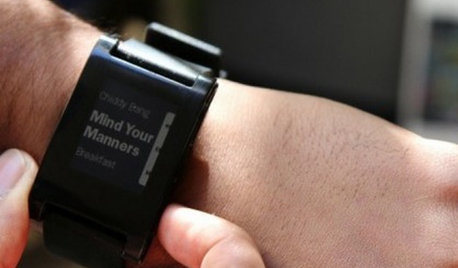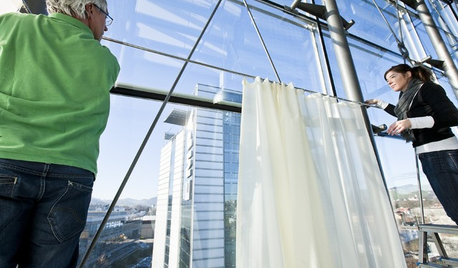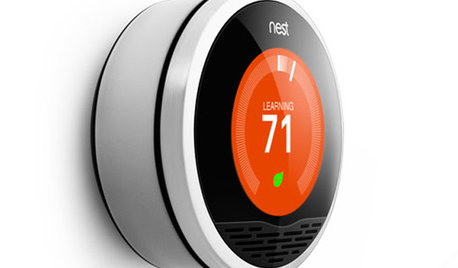Do Ab Machines Shown on TV Really Work? - Report from ABC News
MrsJim
22 years ago
Featured Answer
Comments (10)
billdara
22 years agolast modified: 9 years agojen823
22 years agolast modified: 9 years agoRelated Discussions
Logging Shows on TV
Comments (15)Just one more example from the Axe Men show this week of stupid, dangerous behavior. The new man's first job was to limb a tree with a chainsaw. Maybe one can assume that he had some experience with a chainsaw before, and it looked like it, but he was sent to limb the tree with the idea that he was going to "prove himself" doing this job, especially with how fast he could do it. Well, those of us who were watching closely and have some experience, know exactly what happened. Because he was hurrying so much and/or was inexperienced, he cut/released a "spring pole," a sapling bent down under the fallen tree, in the wrong way. It sprung up and hit him, causing him to loose control of his saw and nearly severely injure himself. Anyone who has done any logging knows of the danger of spring poles. Sometimes they are hidden in the brush/tree top foliage. No "greenhorn" should be given the job of limbing a tree before he is thoroughly instructed in the dangers of spring poles and taught how they should be cut to release them and/or be carefully avoided. These things are capable of breaking a man's leg, splitting a man's head open, or castrating him. But they need not be dangerous if one takes reasonable care. OK, that is example #2 from just this one show. Paula: Those who know my contributions in this forum know that there is no one who loves trees more than I. But I am also a sometimes logger who owns some timberland that is harvested in the most environmentally friendly way possible. When I do my logging, I do everything I can to protect the trees I am not harvesting, and do everything I can to preserve/enhance the diversity of life in the forest. When possible I log in the winter when there is a good covering of snow on the ground. Anyone coming into my timberland in the summer would find no evidence that anyone did any logging, unless they found a stump, and then a treetop some distance away. Not even a scuff on the ground. I also worked, for a few weeks, with a man who had horses for logging. And more than that, he has a specially designed arch, rather than a singletree, that he used to keep the logs from tearing up the ground and/or scraping other trees as they were skidded out. But, even Weyerhauser, which was clear cutting on the sites where I worked, carefully re-forested, and I saw the results of that re-forestation in all stages of re-growth, and honestly, these re-growing forests are beautiful. But, for special timber stands, I am an ardent preservationist. I have been a member of the Save-the Redwoods League for something like 35 years, and did some serious lobbying under the direction of the Sierra Club for the bill to expand the Redwood National Park during the Reagan (the "if you have seen one redwood, you have seen them all" guy) Administration. So, please believe that not all cutting of timber for their wonderful wood, is evil. The main product of my timberland is very high quality hardwood for furniture. I love fine furniture made from the very best quality wild black cherry trees, among other kinds of woods. Wood is a beautiful material, and it a renewable resource, and any really fine wood made into fine furniture is carbon that will be sequestered for many generations, reducing global warming. And then the trees re-grow, providing more opportunities for more carbon removal/sequestration." OK, I am off my soapbox for at least a day or two! --Spruce...See MoreAb Energizer:
Comments (4)This is what I found in internet. Please read this before you order this ab energizer... Good Luck! Good Morning America's consumer correspondent Greg Hunter found that the machines can cause minor skin burns. Experts told him that anyone who thinks that the devices alone will turn them into Mr. Universe is mistaken. The gadgets are based on electronic muscle stimulation, or EMS, a system that delivers an electric charge to make muscles contract. John Porcari, a professor of exercise and sports science at the University of Wisconsin, tested an EMS device similar to those on the market in a study commissioned by the American Council on Exercise. After eight weeks of using the device only, participants had no significant increases in muscle size or strength. "I think people are wasting their time," Porcari said. "I think they're better off spending their money on a personal trainer or buying a membership to a health club, or buying a home piece of exercise equipment that they're going to use." AbTronic declined any comment under advice of their attorney. Ab-Energizer also declined comment, and Fast-Abs did not return phone calls or e-mails sent by Good Morning America. Want Flat Abs? Order Now The Fast-Abs ad claims the technology makes it easy: "It's like our engineer shrunk half a gym of bulky, expensive exercise equipment into a little electronic miracle the size of a pack of matches." Victoria Delaney, a San Francisco Bay area woman who saw the AbTronic infomerical, was intrigued by the thought of achieving amazing abs just like the young woman in the commercial. "That's what I thought I was going to get," Delaney told Hunter, pointing to the buff young woman's flat stomach. After seeing the ad, she immediately reached for her telephone and credit card and ordered an AbTronic. Delaney thought the device would let her get trim while sitting around and reading a book or watching TV. "Sure, I thought it would be easy," Delaney said. Company Warns of Skin Burning Reports Delaney said she used her AbTronic religiously for three days, but then she said she had to stop because it gave her a number of minor but painful burns on her arms, stomach, both legs and her back, making it difficult to sit. When she looked at the instruction booklet later, Delaney discovered that the company warned that "skin irritation and burns ... have been reported." Though Delaney does not have any permanent injuries, her pride is a little scarred, and she feels nae for being taken, she said. But it is easy to see why people like Delaney might be drawn to the devices. Not only does the AbTronic infomercial show seemingly perfect men and women using it, the commercials claim that a University of Maryland study backs up products like theirs. "Their conclusion was that an electronic stimulation was much better than exercise alone, whether you use it as a supplement to your normal workout, or just by itself," a female co-host of the infomercial says. "That proves that you get better results by the use of the AbTronic fitness system," the male co-host chimes in. Machine Can't Do It Alone The University of Maryland scientist who conducted the study, Dr. Gad Alon, published an article about electronic muscle stimulation in 1987. He said that he believes high-quality EMS devices can strengthen the abdominal muscles, but that the AbTronic infomercial took his findings out of context. "In fact, we have used electrical stimulation on abdominal strengthening in a number of studies," he said. "And that particular one [AbTronic] does not look at all like the type of strengthening we do with electrical stimulation." Porcari acknowledges that medically approved EMS devices can play a useful role in rehabilitative medicine. But he says consumers can't comfortably get strong enough contractions from these infomerical devices to build "awesome abs" without real exercise. "To get the benefits, you have to make your muscles contract to a certain level, and that requires you to be able to withstand a lot of pain," he said. Dr. Julio Garcia, a Las Vegas plastic surgeon, appeared in the AbTronic infomercial touting the device. "The nice thing about the AbTronic system is you don't have to go to a gymnasium, where you have to do weight-lifting exercises, where we may have some other medical problems that prevent from doing that - whether it's high blood pressure or bad joints," Garcia says in the infomercial. Garcia told Hunter that although EMS. can help maintain muscle tone, it will not help people lose weight. He also said that the AbTronic commercial took some of his words out of context, and that the machine alone cannot help a person lose weight, lose inches and gain muscle definition. "It was my intent to talk about many things together - diet, exercise, and the machine," Garcia said. "It has apparently been portrayed as just a machine itself. And that's not what I was there to talk about." Delaney says she spent $150 on the AbTronic, and chalks it up to one of life's lessons that she hopes others can learn from. Her advice to anyone lured by the ab machine commercials is simple "Don't buy it," she said....See Morehow do you choose which TV news to watch
Comments (23)I like "Morning Joe" too, wannaretire, except for the darned music they play in the background sometimes. I like Willie Geist who has a 1/2 hour program before MJ and then is on their show a lot. We get two newspapers so I get most of the news from them. In the evening we watch ABC for two reasons. I like Diane Sawyer and the main reason------Jeopardy comes on right after :-) We sleep to either HDTV, CNN or MSNBC. CNN because I hope AC360 will have James Carvell on. I'm totally in love with him!! Cynic, those "coming up next" teasers drive me crazy, too. If you notice, these days they call themselves journalists rather than reporters. I don't know if it's because it sounds fancier or because they're just reading a script that's put in front of them. They do get my appreciation when they're able to pronounce all those foreign names. Like Blagojevich. LOL!...See MoreHeirloom Tomatoes for TV cooking show
Comments (18)Well done PP. Great to see your hard work being shown off. I am not sure they appreciate the effort that you have put in to produce those babies but eh, thats the way of the world we live in. I could ramble on here but... ok...Ray, Adam, I will by kind. Hi Mabb and all, re Mabbs query on blacks.. I have grown a few blacks and for me they are a bit iffy. This past season I grew Carbon, Paul Robeson and Cherokee Purple (if you consider this a black). Last year I grew Black Krim and Cherokee Purple. Cherokee Purple is a winner re; taste, but I cant get it to produce more than One truss of fruit. Carbon this year produced lots of fruit where others didnt but the flavour was just umm. Paul Robeson, well, I cant give a report on this one cause I think I had a dud. Small mahogany bits of yuk that the chooks loved. Black Krim , last year was a late sowing from a seedling I got from a garden show here. I let it sprawl where it wanted and it pumped out some lovely , really black fruit and it has stuck in my mind as a "must give another go". That is until I read on other forums that Black from Tula is better than BK. So, bugger it. I am going to grow both, and side by side in identical pots this coming spring. I will report back NOW bakkto tha foooty...See Morethe_buffalo_gal
22 years agolast modified: 9 years agopanzees36
22 years agolast modified: 9 years agotracymomof4
22 years agolast modified: 9 years agoCynthiaBarron
9 years agolast modified: 9 years agoPepe Rodriguez
8 years agoAnna_Z
7 years agoAlmond Coupons
3 months ago
Related Stories

MOST POPULARHow High Should You Mount Your TV?
Today we look at an important question to consider when locating your television: How high should you set it?
Full Story
HOUSEKEEPINGTackle Big Messes Better With a Sparkling-Clean Dishwasher
You might think it’s self-cleaning, but your dishwasher needs regular upkeep to keep it working hard for you
Full Story
MOST POPULARHow Bluetooth 4.0 Will Change Remote Control
Manage lights, TV, refrigerators and more through your phone or tablet when the latest wireless technology rolls into all your home devices
Full Story
HOME OFFICESQuiet, Please! How to Cut Noise Pollution at Home
Leaf blowers, trucks or noisy neighbors driving you berserk? These sound-reduction strategies can help you hush things up
Full Story
HOME TECHThe Inevitable Future of Drones Around Your Home
As Google joins the push for airborne deliveries, it seems only a matter of time before neighborhoods are buzzing with drones. Is that OK?
Full Story
FALL GARDENING7 Reasons Not to Clean Up Your Fall Garden
Before you pluck and rake, consider wildlife, the health of your plants and your own right to relax
Full Story
HOME TECHHome Tech: There's an Easier, Affordable Future for Home Automation
Say goodbye to the headaches and high price of current systems, and hello to home automation products for the masses
Full StorySponsored



nadine01